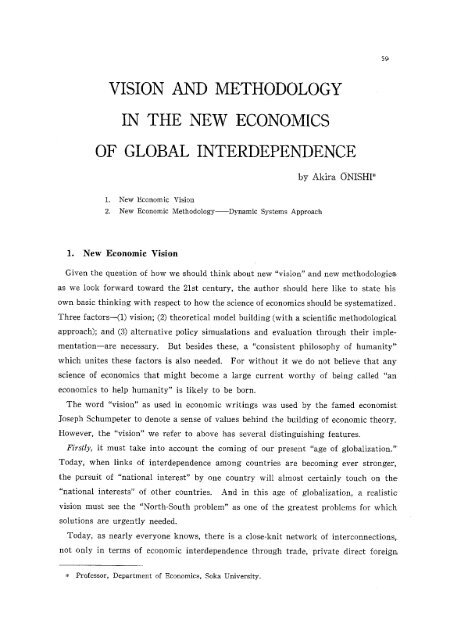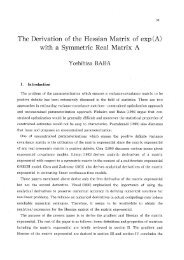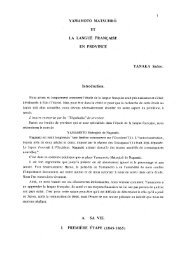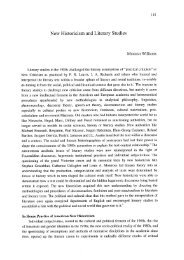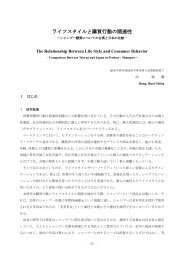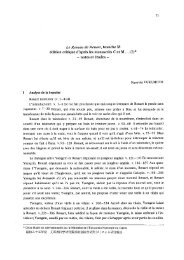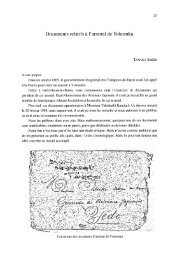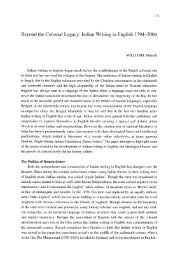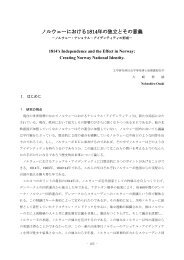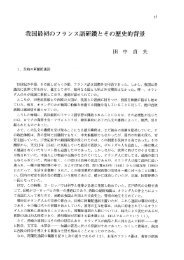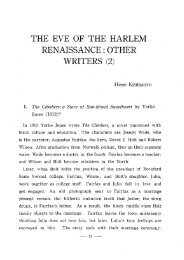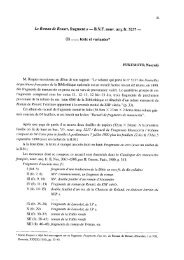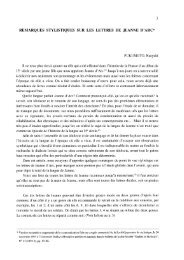vision and methodology in the new economics of global ...
vision and methodology in the new economics of global ...
vision and methodology in the new economics of global ...
Create successful ePaper yourself
Turn your PDF publications into a flip-book with our unique Google optimized e-Paper software.
VISION AND METHODOLOGY<br />
IN THE NEW ECONOMICS<br />
OF GLOBAL INTERDEPENDENCE<br />
1. New Economic Vision<br />
2. New Economic Methodology----Dynamic Systems Approach<br />
1. New Economic Vision<br />
by Akira ONISHI*<br />
Given <strong>the</strong> question <strong>of</strong> how we should th<strong>in</strong>k about <strong>new</strong> "<strong>vision</strong>" <strong>and</strong> <strong>new</strong> methodologies<br />
as we look forward toward <strong>the</strong> 21st century, <strong>the</strong> author should here like to state his<br />
own basic th<strong>in</strong>k<strong>in</strong>g with respect to how <strong>the</strong> science <strong>of</strong> <strong>economics</strong> should be systematized..<br />
Three factors—(1) <strong>vision</strong>; (2) <strong>the</strong>oretical model build<strong>in</strong>g (with a scientific methodological<br />
approach); <strong>and</strong> (3) alternative policy simualations <strong>and</strong> evaluation through <strong>the</strong>ir imple-<br />
mentation—are necessary. But besides <strong>the</strong>se, a "consistent philosophy <strong>of</strong> humanity<br />
which unites <strong>the</strong>se factors is also needed. For without it we do not believe that any<br />
science <strong>of</strong> <strong>economics</strong> that might become a large current worthy <strong>of</strong> be<strong>in</strong>g called "an<br />
<strong>economics</strong> to help humanity" is likely to be born.<br />
The word "<strong>vision</strong>" as used <strong>in</strong> economic writ<strong>in</strong>gs was used by <strong>the</strong> famed economist:<br />
Joseph Schumpeter to denote a sense <strong>of</strong> values beh<strong>in</strong>d <strong>the</strong> build<strong>in</strong>g <strong>of</strong> economic <strong>the</strong>ory..<br />
However, <strong>the</strong> "<strong>vision</strong>" we refer to above has several dist<strong>in</strong>guish<strong>in</strong>g features.<br />
Firstly, it must take <strong>in</strong>to account <strong>the</strong> com<strong>in</strong>g <strong>of</strong> our present "age <strong>of</strong> <strong>global</strong>ization."<br />
Today, when l<strong>in</strong>ks <strong>of</strong> <strong>in</strong>terdependence among countries are becom<strong>in</strong>g ever stronger,<br />
<strong>the</strong> pursuit <strong>of</strong> "national <strong>in</strong>terest" by one country will almost certa<strong>in</strong>ly touch on <strong>the</strong><br />
"national <strong>in</strong>terests" <strong>of</strong> o<strong>the</strong>r countries<br />
. And <strong>in</strong> this age <strong>of</strong> <strong>global</strong>ization, a realistic<br />
<strong>vision</strong> must see <strong>the</strong> "North-South problem" as one <strong>of</strong> <strong>the</strong> greatest problems for which _<br />
solutions are urgently needed.<br />
Today, as nearly everyone knows, <strong>the</strong>re is a close-knit network <strong>of</strong> <strong>in</strong>terconnections, .<br />
not only <strong>in</strong> terms <strong>of</strong> economic <strong>in</strong>terdependence through trade, private direct foreign<br />
* Pr<strong>of</strong>essor, Department <strong>of</strong> Economics, Soka University.<br />
5g
60-±'J Tefi { pVo. XII No. 4<br />
<strong>in</strong>vestments <strong>and</strong> <strong>in</strong>tergovernmental development assistance, but also <strong>in</strong> terms <strong>of</strong> culture<br />
<strong>and</strong> learn<strong>in</strong>g <strong>and</strong> <strong>the</strong> exchange <strong>of</strong> scientific <strong>and</strong> technological <strong>in</strong>formation. Fur<strong>the</strong>r-<br />
more, <strong>in</strong> our age <strong>of</strong> <strong>in</strong>ternationalization <strong>of</strong> <strong>in</strong>formation, knowledge <strong>of</strong> <strong>the</strong> life-styles<br />
<strong>and</strong> <strong>in</strong>tellectual accomplishments <strong>of</strong> people <strong>in</strong> <strong>the</strong> developed <strong>in</strong>dustrial countries is<br />
transmitted, <strong>in</strong> a way that would have earlier been unimag<strong>in</strong>able, to people <strong>in</strong> <strong>the</strong><br />
.develop<strong>in</strong>g countries , while knowledge <strong>of</strong> <strong>the</strong> problems <strong>of</strong> large-scale poverty, fam<strong>in</strong>es,<br />
etc., <strong>in</strong> <strong>the</strong> develop<strong>in</strong>g areas is also transmitted via <strong>in</strong>ternational routes <strong>of</strong> <strong>in</strong>formation<br />
flow to developed areas.<br />
Thus, we might say that as we approach <strong>the</strong> 21st century <strong>the</strong>re are be<strong>in</strong>g formed<br />
routes for diffus<strong>in</strong>g <strong>in</strong>formation which can enable peoples <strong>in</strong> different countries to better<br />
underst<strong>and</strong> one ano<strong>the</strong>r's st<strong>and</strong>po<strong>in</strong>ts. However, at <strong>the</strong> same time, <strong>the</strong> streng<strong>the</strong>n<strong>in</strong>g<br />
r<strong>of</strong> transnational l<strong>in</strong>ks <strong>of</strong> <strong>in</strong>terdependence not rarely highlights situations <strong>in</strong> which<br />
different countries' <strong>in</strong>terests are <strong>in</strong> competition. One example <strong>of</strong> this is <strong>the</strong> severe<br />
friction caused by some aspects <strong>of</strong> Japan's trade with <strong>the</strong> United States <strong>and</strong> <strong>the</strong> EC.<br />
But apart from frictions among developed countries, we are pressed on a <strong>global</strong> level<br />
for solutions to <strong>the</strong> "North-South issues", that is to say, <strong>the</strong> <strong>in</strong>ternational frictions<br />
which accompany <strong>the</strong> widen<strong>in</strong>g <strong>in</strong> <strong>the</strong> gap between developed <strong>and</strong> develop<strong>in</strong>g countries<br />
<strong>in</strong> terms <strong>of</strong> per capita <strong>in</strong>come, technological <strong>and</strong> educational levels.<br />
Because our age is one characterized by <strong>in</strong>creas<strong>in</strong>gly close <strong>in</strong>ternational relations <strong>of</strong><br />
mutual dependence i.e., "<strong>in</strong>terdependence" through economic exchange <strong>and</strong> large-scale<br />
communication <strong>of</strong> <strong>in</strong>formation among countries, <strong>the</strong> author prefers to call it <strong>the</strong> "age<br />
-<strong>of</strong> <strong>global</strong>ization ," or more simply "<strong>the</strong> <strong>global</strong> age." In this age <strong>the</strong> traditional <strong>economics</strong>,<br />
which has been concerned ma<strong>in</strong>ly with one or ano<strong>the</strong>r s<strong>in</strong>gle country as its object<br />
c<strong>of</strong> study , faces <strong>the</strong> dilemma <strong>of</strong> be<strong>in</strong>g unable to give proper solutions to problems on<br />
<strong>the</strong> <strong>global</strong> level.1><br />
Consequently, <strong>in</strong> build<strong>in</strong>g <strong>new</strong> economic <strong>the</strong>ory we naturally need to have a <strong>vision</strong><br />
that is characterized by approach<strong>in</strong>g problems from a truly <strong>global</strong> viewpo<strong>in</strong>t.<br />
Secondly, <strong>the</strong>re is <strong>the</strong> need for <strong>in</strong>terdiscipl<strong>in</strong>ary research. While <strong>in</strong> <strong>the</strong> traditional eco-<br />
nomics matters outside tha limits <strong>of</strong> "<strong>economics</strong>" were not considered relevant <strong>and</strong> were<br />
dispensed with for purposes <strong>of</strong> design<strong>in</strong>g economic <strong>the</strong>ory, today <strong>and</strong> <strong>in</strong> <strong>the</strong> future any<br />
conceptualization <strong>of</strong> <strong>economics</strong> must necessarily <strong>in</strong>volve a many-eyed perspective <strong>in</strong>-<br />
clud<strong>in</strong>g such matters as natural resources, energy, environment, education, <strong>and</strong> <strong>in</strong>di-<br />
vidual <strong>and</strong> public welfare.<br />
1) Akira Onishi, Chikyuka jidai no Nihon keizai (Japan's Economy <strong>in</strong> <strong>the</strong> Global Age) , Nihon<br />
Keizai Sh<strong>in</strong>bunsha, 1974, p. 27.
March 1982 Vision <strong>and</strong> Methodology <strong>in</strong> <strong>the</strong> New Economics 61<br />
As is well known, <strong>the</strong> traditional systematizations <strong>of</strong> <strong>economics</strong> have tended to follow<br />
paths <strong>of</strong> becom<strong>in</strong>g ever more specialized <strong>and</strong> ever more broken down <strong>in</strong>to narrow com-<br />
partments. If we take a look at university courses, for example, we see that students<br />
choose from a menu <strong>of</strong> extremely diversified <strong>economics</strong> courses, under such names as<br />
Macroeconomic Theory, Microeconomic Theory, History <strong>of</strong> Economic Theory, Economic<br />
Policy, Public F<strong>in</strong>ance, Monetary Theory, <strong>and</strong> International Economics, etc.<br />
Indeed, <strong>the</strong> field <strong>of</strong> "<strong>economics</strong>" has become specialized <strong>and</strong> compartmentalized even<br />
to <strong>the</strong> po<strong>in</strong>t where we may <strong>in</strong> some cases have what could be called <strong>the</strong> "specialized<br />
ignoramus." Nowadays <strong>the</strong> "economist" may possibly have <strong>the</strong>ir credentials as a<br />
scholar called <strong>in</strong>to question if <strong>the</strong>y do not cont<strong>in</strong>ually digest <strong>the</strong> bulg<strong>in</strong>g number <strong>of</strong><br />
domestic <strong>and</strong> foreign reference works just <strong>in</strong> <strong>the</strong>ir own narrow compartmental doma<strong>in</strong>.<br />
As a result, <strong>the</strong>y necessarily have great deal <strong>of</strong> time taken away <strong>in</strong> <strong>the</strong> pursuit <strong>of</strong><br />
"reference materials<br />
," <strong>and</strong> <strong>of</strong>ten never gets around to o<strong>the</strong>r important matters <strong>in</strong><br />
doma<strong>in</strong>s which may not be strictly "economic" accord<strong>in</strong>g to traditional notions. Con-<br />
sequently, <strong>the</strong>y may spend a whole lifetime cl<strong>in</strong>g<strong>in</strong>g with a one-track m<strong>in</strong>d to <strong>the</strong>ir<br />
own narrowly specialized field <strong>and</strong> never form<strong>in</strong>g a wider <strong>vision</strong>.<br />
This situation tends to make <strong>the</strong> <strong>vision</strong> <strong>of</strong> many economists dist<strong>in</strong>ctly monocular.<br />
The fact is that many economists take only "economic" problems <strong>in</strong> <strong>the</strong> narrow sense<br />
as hav<strong>in</strong>g importance <strong>and</strong> discard from consideration related fields <strong>of</strong> knowledge <strong>and</strong><br />
<strong>in</strong>quiry, with <strong>the</strong> result that <strong>the</strong>ir <strong>the</strong>oretical models tend to be extremely oversimplified.<br />
This is precisely <strong>the</strong> great dilemma which contemporary economists face. To overcome<br />
this dilemma, Gunnar Myrdal suggests <strong>the</strong> utility <strong>of</strong> <strong>in</strong>terdiscipl<strong>in</strong>ary research.2> He<br />
argues that specialized knowledge is com<strong>in</strong>g to be required even <strong>in</strong> fields which were<br />
earlier discarded from purview <strong>in</strong> <strong>the</strong> traditional "<strong>economics</strong>", <strong>and</strong> that <strong>the</strong>re is an<br />
<strong>in</strong>creas<strong>in</strong>g need to organize research that mobilizes <strong>the</strong> knowledge <strong>and</strong> judgemental<br />
capabilities <strong>of</strong> specialists <strong>in</strong> various fields.<br />
This signifies <strong>the</strong> end <strong>of</strong> an era <strong>in</strong> which economists could properly restrict <strong>the</strong>ir<br />
research only to "<strong>economics</strong>." Today it is required for economists that <strong>the</strong>y have not<br />
only an adequate ground<strong>in</strong>g <strong>in</strong> <strong>economics</strong> but also an <strong>in</strong>tellectual breadth <strong>and</strong> basic<br />
knowledge which allows an underst<strong>and</strong><strong>in</strong>g <strong>of</strong> specialized knowledge about a wide range<br />
<strong>of</strong> matters <strong>in</strong>clud<strong>in</strong>g resources, population, environment, energy, education <strong>and</strong> welfare..<br />
Today it is this sort <strong>of</strong> economic "<strong>vision</strong>" which is so very much needed.<br />
The real world does not fit <strong>in</strong>to <strong>the</strong> scholastic subdi<strong>vision</strong>s <strong>and</strong> compartments <strong>of</strong> one<br />
2) Gunnar Myrdal, Aga<strong>in</strong>st <strong>the</strong> Stream: Critical Essays on Economics, R<strong>and</strong>om House, New York,<br />
1942.
62iJfJaff{ py Vo. XII No. 4<br />
,or ano<strong>the</strong>r "discipl<strong>in</strong>e ," but ra<strong>the</strong>r comprises a much more complicated system. In<br />
o<strong>the</strong>r words, although boundaries for specialized fields have been arbitrarily marked out<br />
by human be<strong>in</strong>gs for <strong>the</strong> sake <strong>of</strong> convenience, <strong>the</strong> real world is an organic system <strong>the</strong><br />
parts <strong>of</strong> which are complexly <strong>in</strong>terconnected <strong>in</strong> ways that transcend <strong>the</strong>se arbitrary<br />
doma<strong>in</strong>s. What is required <strong>in</strong> <strong>the</strong> <strong>new</strong> era is precisely <strong>the</strong> k<strong>in</strong>ds <strong>of</strong> <strong>vision</strong> which allow<br />
a comprehensive, unified grasp <strong>of</strong> this multilayered <strong>and</strong> organic reality.<br />
Thirdly, a realistic economic <strong>vision</strong> must allow a realistic grasp <strong>of</strong> time-dependent<br />
dynamic systems structures, tak<strong>in</strong>g <strong>in</strong>to account <strong>the</strong> changes from past to present <strong>and</strong><br />
<strong>the</strong> changes which will come as we move <strong>in</strong>to <strong>the</strong> future.<br />
In th<strong>in</strong>k<strong>in</strong>g about "economic <strong>the</strong>ory" <strong>in</strong> <strong>the</strong> perspective <strong>of</strong> <strong>the</strong> constantly chang<strong>in</strong>g<br />
realities <strong>of</strong> human society, we must study <strong>the</strong> legacies <strong>of</strong> <strong>the</strong> past, must be aware <strong>of</strong><br />
present realities, <strong>and</strong> must at <strong>the</strong> same time consider how <strong>the</strong>se relate to <strong>the</strong> future<br />
,<strong>of</strong> mank<strong>in</strong>d as we work on solutions to problems that are currently press<strong>in</strong>g .<br />
It is <strong>in</strong>terest<strong>in</strong>g to note that one aspect <strong>of</strong> traditional Japanese thought is a "dynamic"<br />
way <strong>of</strong> look<strong>in</strong>g at past, present <strong>and</strong> future, accord<strong>in</strong>g to which our life <strong>and</strong> actions are<br />
determ<strong>in</strong>ed not merely by <strong>the</strong> present, but ra<strong>the</strong>r <strong>the</strong> present is <strong>in</strong> turn determ<strong>in</strong>ed<br />
by an accumulation <strong>of</strong> circumstances, thoughts <strong>and</strong> attitudes from <strong>the</strong> past, i.e., by<br />
what is <strong>in</strong> Sanskrit called "karma" (Japanese shukugo or <strong>in</strong>). A model is presented <strong>of</strong><br />
a world <strong>of</strong> dynamic <strong>in</strong>teraction <strong>of</strong> cause <strong>and</strong> effect <strong>in</strong> which voluntarily taken action<br />
<strong>in</strong> <strong>the</strong> present can change <strong>the</strong> course <strong>of</strong> undesirable karma from <strong>the</strong> past <strong>and</strong> can even<br />
<strong>in</strong>fluence or determ<strong>in</strong>e <strong>the</strong> future.<br />
This concept <strong>in</strong> traditional Japanese thought which underst<strong>and</strong>s human life from a<br />
dynamic po<strong>in</strong>t <strong>of</strong> view l<strong>in</strong>k<strong>in</strong>g past, present <strong>and</strong> future, shares a common ve<strong>in</strong> with<br />
<strong>the</strong> fundamental approach by which <strong>the</strong> science <strong>of</strong> <strong>economics</strong> should, seek to under-<br />
st<strong>and</strong> <strong>the</strong> exist<strong>in</strong>g structure <strong>of</strong> human society <strong>and</strong> "<strong>the</strong> economy."<br />
"Economic <strong>the</strong>ory" is sometimes subdivided <strong>in</strong>to such compartments as "static eco -<br />
nomics," "dynamic <strong>economics</strong>," <strong>and</strong> even "comparative statics," supposed to lie between<br />
<strong>and</strong> jo<strong>in</strong> <strong>the</strong> o<strong>the</strong>r two. However, <strong>the</strong>re cannot be <strong>in</strong> <strong>the</strong> real world any true "statics"<br />
,or "comparative statics ." It is clear that to <strong>the</strong> extent that we may fail to <strong>in</strong>sist on<br />
underst<strong>and</strong><strong>in</strong>g realities through an active "dynamics" approach we shall be unable to<br />
get close to <strong>the</strong> true nature <strong>of</strong> <strong>the</strong>se realities.<br />
In speak<strong>in</strong>g about "dynamics," we should note that Ragnar Frisch, known for his<br />
models <strong>of</strong> economic cycles, has def<strong>in</strong>ed "dynamics" as be<strong>in</strong>g operative when an economic<br />
system <strong>in</strong>cludes time as a fundamentally important variable.3) Paul Samuelson follows<br />
3) Ragnar Frisch, "On <strong>the</strong> Notion <strong>of</strong> Fquilibrium <strong>and</strong> Diseguilibrium," Review <strong>of</strong> Economic
March 1982 Vision <strong>and</strong> Methodology <strong>in</strong> <strong>the</strong> New Economics63<br />
this def<strong>in</strong>ition <strong>in</strong> his Foundations <strong>of</strong> Economic Analysis (1947);4) But while truly it cannot<br />
be denied that, as Frisch says, time <strong>in</strong> an economic system is an important factor<br />
connect<strong>in</strong>g past, present <strong>and</strong> future, we should ra<strong>the</strong>r like to emphasize <strong>the</strong> possibility<br />
that economic system structures may <strong>the</strong>mselves change through time. Of course no<br />
system structure can exist apart from human activities, <strong>and</strong> s<strong>in</strong>ce any "system structure"<br />
represents a sort <strong>of</strong> "feedback system" <strong>of</strong> <strong>in</strong>teraction between human be<strong>in</strong>gs <strong>and</strong> our<br />
environment, it is only natural to th<strong>in</strong>k <strong>of</strong> <strong>the</strong> system structure as chang<strong>in</strong>g dynamically<br />
over time. This is particularly characteristic <strong>of</strong> <strong>the</strong> sorts <strong>of</strong> dynamic systems con-<br />
sidered by <strong>the</strong> science <strong>of</strong> <strong>economics</strong>. And for that very reason, while any attempt to<br />
devise a system to reflect reality is difficult, it may <strong>of</strong>ten happen that when we try<br />
to apply a given "system" to economic matters <strong>the</strong> "system" may already be divorced<br />
from reality, or reality may already have marched ahead <strong>of</strong> it. The "science <strong>of</strong> eco-<br />
nomics" is constantly runn<strong>in</strong>g after reality, <strong>and</strong> yet <strong>in</strong> many cases, it may be unable<br />
to catch up, giv<strong>in</strong>g rise to a sort <strong>of</strong> "cognition gap."<br />
In our attempt to get around this gap, we must at <strong>the</strong> very least proceed toward<br />
solutions <strong>of</strong> <strong>the</strong> urgent problems <strong>of</strong> <strong>the</strong> present, <strong>and</strong> do so with a <strong>vision</strong> <strong>of</strong> <strong>the</strong> direc-<br />
tions <strong>in</strong> which human society is likely to <strong>and</strong> or should with wise progress.<br />
The fourth k<strong>in</strong>d <strong>of</strong> <strong>vision</strong> concerns <strong>the</strong> formation <strong>of</strong> a peaceful order <strong>in</strong> <strong>in</strong>ternational<br />
economic relations.<br />
As stated earlier, <strong>the</strong> present-day develop<strong>in</strong>g countries are attempt<strong>in</strong>g to take common<br />
actions with a view to form<strong>in</strong>g a "New International Economic Order." The developed<br />
countries, for <strong>the</strong>ir part, must not only respond to <strong>the</strong> problems <strong>of</strong> <strong>the</strong>ir "own" eco-<br />
nomies but also, at a <strong>global</strong> level, to <strong>the</strong> calls for a <strong>new</strong> type <strong>of</strong> order <strong>in</strong> <strong>the</strong> <strong>in</strong>ter-<br />
national economy. If, however, <strong>in</strong> this situation each country should stubbornly try<br />
to force through types <strong>of</strong> "logic" based on its own national egotism, it is unlikely that<br />
a peaceful or just order among mank<strong>in</strong>d, such as that envisaged <strong>in</strong> <strong>the</strong> proposed <strong>new</strong><br />
economic arrangements, can be formed. At <strong>the</strong> same time, <strong>the</strong>re is not guarantee that<br />
to form a truly peaceful order it is sufficient only to organize a <strong>new</strong> <strong>global</strong> community<br />
<strong>in</strong> such a way as to act <strong>in</strong> response to <strong>the</strong> "order" built up by <strong>the</strong> present-day<br />
developed countries.<br />
The fifth sort <strong>of</strong> <strong>vision</strong> concerns <strong>the</strong> dignity <strong>of</strong> human life. We should like to th<strong>in</strong>k<br />
that one measure <strong>of</strong> human society's progress is <strong>the</strong> ways <strong>in</strong> which respect for <strong>the</strong><br />
Studies, III, 1936, p. 100.<br />
4) Paul M. Samuelson, Foundations <strong>of</strong> Economic Analysis, MIT Press, Cambridge, Massachusetts,<br />
1950. pp. 284-285.
6-1--T-1J Ali IT g{ pf Vo. XII No. 4<br />
dignity <strong>of</strong> life is realized <strong>in</strong> practice.<br />
A universal <strong>and</strong> deeply felt respect for <strong>the</strong> human dignity is still only a widely<br />
admitted goal <strong>and</strong> does not yet live with reality at <strong>the</strong> <strong>global</strong> level. The most im-<br />
portant grounds for say<strong>in</strong>g are <strong>the</strong> follow<strong>in</strong>g:<br />
Well after modern post-feudal society came <strong>in</strong>to be<strong>in</strong>g, <strong>in</strong> <strong>the</strong> 20th century humank<strong>in</strong>d<br />
has twice experienced "world wars," <strong>and</strong> <strong>the</strong> question rema<strong>in</strong>s as to why wars which<br />
have massively exterm<strong>in</strong>ated human lives have been repeated <strong>and</strong> why armed race are<br />
still be<strong>in</strong>g prepared for.<br />
A world <strong>of</strong> truly humane behavior on <strong>the</strong> part <strong>of</strong> humans is, needless to say, what<br />
is be<strong>in</strong>g taught about <strong>in</strong> regard to Christianity's world <strong>of</strong> love <strong>and</strong> <strong>in</strong> regard to Bud-<br />
dhism's world <strong>of</strong> compassion to be discerned from <strong>in</strong>sightful meditation on human ex-<br />
istence. Unless, <strong>in</strong> our time, a peaceful <strong>in</strong>ternational order which must be <strong>the</strong> basis<br />
for such a world <strong>of</strong> love <strong>and</strong> compassion is brought <strong>in</strong>to be<strong>in</strong>g, it is possible that<br />
humank<strong>in</strong>d will aga<strong>in</strong> come up with an excuse to repeat a war <strong>of</strong> mass exterm<strong>in</strong>ation.<br />
At present much is be<strong>in</strong>g said about <strong>the</strong> "oil crisis" <strong>and</strong> attention is focused on <strong>the</strong><br />
development <strong>of</strong> such substitutes as nuclear <strong>and</strong> solar energy. However, because nuclear<br />
energy is a double-edged sword which can be used for both peaceful <strong>and</strong> destructive<br />
purposes, many people take an antagonistic attitude toward <strong>the</strong> development <strong>of</strong> nuclear<br />
power <strong>and</strong> seek through <strong>the</strong> elim<strong>in</strong>ation <strong>of</strong> nuclear power noth<strong>in</strong>g less than a condition<br />
to enable humank<strong>in</strong>d's survival. Never<strong>the</strong>less, by do<strong>in</strong>g noth<strong>in</strong>g more than take a<br />
negative attitude toward <strong>the</strong> development <strong>of</strong> one or ano<strong>the</strong>r form <strong>of</strong> energy for peaceful<br />
purposes, we can <strong>in</strong>vite a serious energy crisis without contribut<strong>in</strong>g to solutions for<br />
<strong>the</strong> problems <strong>of</strong> economic hardship <strong>and</strong> social unrest that would result.<br />
What is here be<strong>in</strong>g called to task for a solution is <strong>the</strong> constitution <strong>of</strong> <strong>the</strong> human<br />
spirit, Can it, for example, allow nuclear energy to be used only for peaceful purposes<br />
<strong>and</strong> not for purposes <strong>of</strong> military threat or aggression? Unless this problem is solved,<br />
war crises cannot be avoided regardless <strong>of</strong> <strong>the</strong> extent to which nuclear power might be<br />
elim<strong>in</strong>ated. No response to <strong>the</strong> question <strong>of</strong> nuclear energy development could be so<br />
puerile as to believe that only by its elim<strong>in</strong>ation can wars be avoided.<br />
We cannot <strong>the</strong>refore th<strong>in</strong>k about a <strong>new</strong> science <strong>of</strong> <strong>economics</strong> without <strong>in</strong>novative<br />
<strong>vision</strong> <strong>in</strong> regard to how humank<strong>in</strong>d can ma<strong>in</strong>ta<strong>in</strong> its life <strong>and</strong> activities <strong>in</strong>to <strong>the</strong> distant<br />
future, or <strong>in</strong> regard to <strong>the</strong> "<strong>in</strong>novation" <strong>in</strong> <strong>the</strong> life <strong>and</strong> activities <strong>of</strong> <strong>in</strong>dividual men<br />
<strong>and</strong> women that will make this cont<strong>in</strong>uity possible.
March 1982 Vision <strong>and</strong> Methodology <strong>in</strong> <strong>the</strong> New Economics65<br />
2. New Economic Methodology----Dynamic Systems Approach<br />
Here we should like to consider <strong>the</strong> <strong>methodology</strong> <strong>of</strong> how, based on <strong>the</strong> types <strong>of</strong><br />
"<strong>vision</strong>" discussed <strong>in</strong> <strong>the</strong> forego<strong>in</strong>g section , we can best approach <strong>the</strong> doma<strong>in</strong> <strong>of</strong> eco-<br />
nomics <strong>and</strong> construct a framework <strong>of</strong> economic <strong>the</strong>ory.<br />
Generally speak<strong>in</strong>g, one type <strong>of</strong> <strong>methodology</strong>, known as <strong>the</strong> "deductive method," is<br />
to start from a basic proposition or proposition around which a logic is developed to<br />
flesh out, so to speak, a relatively lean <strong>and</strong> simple start<strong>in</strong>g po<strong>in</strong>t. The deductive<br />
method is a reflection <strong>of</strong> abstract thought processes. There is, on <strong>the</strong> o<strong>the</strong>r h<strong>and</strong>, <strong>the</strong><br />
"<strong>in</strong>ductive method ," which takes its cue from experience. In a certa<strong>in</strong> sense, what<br />
might be called "experimentally verifiable <strong>in</strong>vestigation" belongs to this category. The<br />
<strong>in</strong>ductive method seeks to discover, through an analysis <strong>of</strong> reality, laws or rules which<br />
with some consistency apply to that reality.<br />
A comb<strong>in</strong>ation <strong>of</strong> both <strong>of</strong> <strong>the</strong> above approaches is <strong>of</strong>ten thought to be needed <strong>in</strong><br />
usual <strong>in</strong>stances <strong>of</strong> our try<strong>in</strong>g to build a <strong>the</strong>oretical framework. In o<strong>the</strong>r words, <strong>in</strong><br />
<strong>the</strong> absence <strong>of</strong> factual <strong>in</strong>formation, to try to develop a logic start<strong>in</strong>g only from a given<br />
abstract proposition will typically br<strong>in</strong>g forth a <strong>the</strong>ory that is full <strong>of</strong> illusions <strong>and</strong><br />
lacks persuasive power as an explanation <strong>of</strong> factual reality. On <strong>the</strong> o<strong>the</strong>r h<strong>and</strong>, by<br />
wholly ignor<strong>in</strong>g <strong>the</strong> deductive method <strong>and</strong> pay<strong>in</strong>g attention only to <strong>the</strong> <strong>in</strong>ductive<br />
method, we may end up only with an array <strong>of</strong> facts, or a collection, from among those<br />
facts <strong>of</strong> cause-<strong>and</strong>-effect relationships, without this <strong>in</strong> itself be<strong>in</strong>g sufficient as an ap-<br />
proach to a scholarly or scientific systematization. In this regard, <strong>the</strong>n, it is necessary<br />
to atta<strong>in</strong> a grasp <strong>of</strong> both <strong>the</strong> <strong>in</strong>ductive <strong>and</strong> deductive methods, <strong>in</strong> as comprehensive a<br />
way as we can.<br />
This hav<strong>in</strong>g been said, however, a great <strong>the</strong>oretical error <strong>in</strong> <strong>the</strong> so-called modern<br />
science <strong>of</strong> <strong>economics</strong> may be traced to <strong>the</strong> practice <strong>of</strong> develop<strong>in</strong>g abstract <strong>the</strong>ories<br />
grounded <strong>in</strong> "<strong>vision</strong>s" which ignore reality. For example, by develop<strong>in</strong>g <strong>the</strong>ories based<br />
on <strong>the</strong> supposed logic <strong>of</strong> "perfect competition," reality is expla<strong>in</strong>ed, for <strong>the</strong> sake <strong>of</strong><br />
convenience, accord<strong>in</strong>g to a model which treats reality <strong>in</strong> an extremely idealized way,<br />
s<strong>in</strong>ce "perfect competition" cannot exist <strong>in</strong> <strong>the</strong> real world. By thus beautify<strong>in</strong>g <strong>the</strong><br />
<strong>the</strong>ory <strong>and</strong> mak<strong>in</strong>g it more elegant than necessary, economists may possibly attract<br />
people's attention <strong>and</strong> even admiration, but it may also happen that policies derived<br />
from such very unrealistic <strong>the</strong>ories may become a sort <strong>of</strong> cancer ra<strong>the</strong>r than a true<br />
benefit to <strong>the</strong> public. About such matters we should <strong>the</strong>refore be duly cautious.<br />
While we should be cautious, it would, however, be go<strong>in</strong>g too far to th<strong>in</strong>k that <strong>the</strong>
66 FIJ AIJ Jj F { p Vol. XII No. 4<br />
now more-or-less traditional, systems <strong>of</strong> <strong>the</strong>ory with<strong>in</strong> <strong>the</strong> modern science <strong>of</strong> <strong>economics</strong><br />
are wholly useless, just "a hundred cases <strong>of</strong> harmful mischief <strong>and</strong> not a s<strong>in</strong>gle benefit."<br />
We must, <strong>of</strong> course, nurture <strong>the</strong> capacity to judge accurately what is harmful <strong>and</strong> what<br />
is beneficial. A true capacity for criticism is not possible without a good knowledge<br />
<strong>of</strong> <strong>the</strong> systems <strong>of</strong> thought <strong>of</strong> those persons we may be criticiz<strong>in</strong>g. By way <strong>of</strong> example,<br />
Karl Marx, <strong>in</strong> criticiz<strong>in</strong>g <strong>the</strong> classical <strong>economics</strong> <strong>and</strong> giv<strong>in</strong>g rise to <strong>the</strong> <strong>new</strong> "Marxian"<br />
<strong>economics</strong> based on his own <strong>vision</strong> <strong>in</strong> regard to "dialectic materialism," avidly read<br />
large numbers <strong>of</strong> publications which conta<strong>in</strong>ed <strong>the</strong> accumulation <strong>of</strong> knowledge <strong>and</strong><br />
suppositions <strong>in</strong> which <strong>the</strong> <strong>vision</strong>s <strong>of</strong> <strong>the</strong> classical economists had been grounded.<br />
As we go toward <strong>the</strong> 21st century <strong>and</strong> try to establish a <strong>new</strong> <strong>economics</strong> that will<br />
truly benefit humank<strong>in</strong>d, it will probably be necessary to put forth even more effort<br />
than that expended by Marx. This is because we have before us an accumulation <strong>of</strong><br />
knowledge <strong>and</strong> <strong>in</strong>formation that is truly enormous <strong>in</strong> comparison with <strong>the</strong> reference<br />
materials about <strong>economics</strong> which Marx could encounter <strong>in</strong> <strong>the</strong> mid-19th century. Among<br />
this mass <strong>of</strong> materials we must have <strong>the</strong> <strong>in</strong>tellectual capacity to discrim<strong>in</strong>ate between<br />
those which have truly <strong>the</strong> value <strong>of</strong> gold <strong>and</strong> o<strong>the</strong>rs that perhaps at first glance may<br />
appear scholarly but may have only a Mafia-like neretriciousness.<br />
Because our task is to ga<strong>in</strong> a grasp <strong>of</strong> <strong>the</strong> whole <strong>of</strong> economic society <strong>and</strong> not just<br />
a part <strong>of</strong> it, <strong>the</strong> most important problem is how to look at reality <strong>and</strong> place it <strong>in</strong> a<br />
<strong>the</strong>oretical framework. Regardless <strong>of</strong> how much we may study <strong>the</strong> scholarly append-<br />
ages <strong>of</strong> <strong>the</strong>oretical models, <strong>the</strong>se alone will not produce credible answers; while on <strong>the</strong><br />
o<strong>the</strong>r h<strong>and</strong> if we only look directly at facts without <strong>in</strong>tellectual tools with which to<br />
perform an analysis, our underst<strong>and</strong><strong>in</strong>g <strong>of</strong> <strong>the</strong> huge <strong>and</strong> complex "field <strong>of</strong> action" around<br />
us may only end up badly shrunken.<br />
How to respond to this k<strong>in</strong>d <strong>of</strong> problem has been a great difficulty for economists <strong>in</strong><br />
<strong>the</strong> past <strong>and</strong> also at present. In response to <strong>the</strong> challenge which this difficulty has<br />
posed, "econometrics" entered <strong>the</strong> scene as a <strong>new</strong> analytical tool comb<strong>in</strong><strong>in</strong>g aspects <strong>of</strong><br />
<strong>the</strong> traditional <strong>in</strong>ductive <strong>and</strong> deductive methods.<br />
Econometrics is a scientific method comb<strong>in</strong><strong>in</strong>g, as <strong>the</strong> word suggests, <strong>economics</strong> <strong>and</strong><br />
statistics. In o<strong>the</strong>r words, <strong>in</strong> order to make <strong>the</strong> science <strong>of</strong> <strong>economics</strong> more objective<br />
<strong>and</strong> scientific, econometrics may be said to have jo<strong>in</strong>ed to <strong>economics</strong> <strong>the</strong> methods <strong>of</strong><br />
statistics, by first quantify<strong>in</strong>g reality <strong>in</strong> terms <strong>of</strong> specific statistical data <strong>and</strong> <strong>the</strong>n, by<br />
statistical methods, verify<strong>in</strong>g <strong>the</strong> utility <strong>of</strong> a <strong>the</strong>oretical model.<br />
After <strong>the</strong> Second World War, econometrics has achieved very rapid progress <strong>and</strong> today<br />
is a major branch <strong>of</strong> <strong>economics</strong> <strong>in</strong> all countries. In both <strong>the</strong>ory <strong>and</strong> practical applica-
March 1982 Vision <strong>and</strong> Methodology <strong>in</strong> <strong>the</strong> New Economics67<br />
tions <strong>of</strong> <strong>global</strong> model<strong>in</strong>g, especially noteworthy achievements <strong>in</strong> econometrics have been<br />
made by Lawrence Kle<strong>in</strong> <strong>of</strong> <strong>the</strong> University <strong>of</strong> Pennsylvania <strong>in</strong> <strong>the</strong> United States.<br />
Kle<strong>in</strong>, who is currently organiz<strong>in</strong>g "Project LINK" at a <strong>global</strong> level, has <strong>in</strong> coopera-<br />
tion with universities, central banks <strong>and</strong> <strong>in</strong>ternational organizations developed a system<br />
to make short-term forecasts <strong>of</strong> <strong>the</strong> world economy, by means <strong>of</strong> l<strong>in</strong>k<strong>in</strong>g on an <strong>in</strong>ter-<br />
national scale economic models for various <strong>in</strong>dividual countries. Unlike previous at-<br />
tempts at bus<strong>in</strong>ess cycle forecasts which took as <strong>the</strong>ir objects <strong>of</strong> study <strong>the</strong> economies<br />
<strong>of</strong> s<strong>in</strong>gle countries, Project LINK is dist<strong>in</strong>guished by <strong>the</strong> fact that it carries out, from<br />
a <strong>global</strong> perspective, forecasts for <strong>the</strong> world economy. For this reason it may be<br />
called an appropriate <strong>methodology</strong> for <strong>the</strong> current age which <strong>the</strong> author has called <strong>the</strong><br />
"age <strong>of</strong> <strong>global</strong>ization<br />
." In <strong>the</strong> 21st century Project LINK <strong>and</strong> similar undertak<strong>in</strong>gs<br />
will no doubt be seen by people as very ord<strong>in</strong>ary th<strong>in</strong>gs, given <strong>the</strong> fur<strong>the</strong>r develop-<br />
ment <strong>of</strong> computers along with <strong>the</strong>ir s<strong>of</strong>tware <strong>and</strong> peripheral equipment, <strong>and</strong> given <strong>the</strong><br />
likely progress <strong>in</strong> technology for <strong>the</strong> transmission <strong>of</strong> large amounts <strong>of</strong> <strong>in</strong>formation,<br />
us<strong>in</strong>g artificial satellites <strong>and</strong> o<strong>the</strong>r <strong>new</strong> means. Econometrics has thus come forward<br />
as a powerful tool that radically supersedes former <strong>the</strong>oretical models based on abstract<br />
deductive methodologies.<br />
Never<strong>the</strong>less, it cannot be denied that econometrics, <strong>in</strong> addition to its strong po<strong>in</strong>ts,<br />
also has some weaknesses. For example, econometric methods have been burdened with<br />
considerable difficulties <strong>in</strong> relation to historical approach <strong>and</strong> long-term outlook (<strong>the</strong><br />
importance <strong>of</strong> which has been emphasized by Marx among o<strong>the</strong>rs), <strong>and</strong> especially <strong>in</strong><br />
regard to how to h<strong>and</strong>le changes <strong>in</strong> "system structure." Given <strong>the</strong> fact that future<br />
forecasts us<strong>in</strong>g an econometrics model are based on various types <strong>of</strong> "structural para-<br />
meters" derived from past data over a period <strong>of</strong> years, a chronic source <strong>of</strong> vexation<br />
is <strong>the</strong> tendency for structural parameters derived from past data not to rema<strong>in</strong> un-<br />
chang<strong>in</strong>g <strong>and</strong> <strong>of</strong> constant relative importance forever <strong>in</strong>to <strong>the</strong> future. This is because<br />
<strong>the</strong> economic society around us is a fluid, changeable one <strong>and</strong> not a rigid society where<br />
structural parameters are permanent <strong>and</strong> unchang<strong>in</strong>g.<br />
Of course some structural parameters will have a very high degree <strong>of</strong> stability over<br />
time, but econometrics models never<strong>the</strong>less face <strong>the</strong> dilemma that certa<strong>in</strong> o<strong>the</strong>r struc-<br />
tural parameters are very changeable, thus pos<strong>in</strong>g a problem <strong>in</strong> forecast<strong>in</strong>g. Indeed,<br />
forecasts <strong>of</strong> <strong>the</strong> future us<strong>in</strong>g econometrics methods are always threatened by this type<br />
<strong>of</strong> defect. In <strong>the</strong> case that <strong>the</strong> world economy should , for example, fall <strong>in</strong>to great<br />
confusion due to an unforeseen "oil crisis" or some o<strong>the</strong>r reason, forecasts by this<br />
method would be extremely difficult.
68 ~[J4i1GVI ''4 R a XVo. XII No. 4<br />
In fairly recent years, <strong>the</strong>re has come <strong>in</strong>to use an analytical method which supple-<br />
ments this weak po<strong>in</strong>t <strong>in</strong> structural parameter-dependent econometrics models. Known<br />
as "System Dynamics," or SD for short, it is <strong>the</strong> method used <strong>in</strong> construct<strong>in</strong>g <strong>the</strong> World<br />
System Dynamics Model <strong>of</strong> Jay Forrester, who ga<strong>in</strong>ed rapid recognition for his discus-<br />
sion <strong>of</strong> <strong>the</strong> model <strong>in</strong> <strong>the</strong> report to <strong>the</strong> Club <strong>of</strong> Rome entitled The Limits to Growth.<br />
In his earlier book, Pr<strong>in</strong>ciples <strong>of</strong> Systems,5> Forrester expla<strong>in</strong>s <strong>the</strong> elementary pr<strong>in</strong>ciple<br />
<strong>of</strong> System Dynamics <strong>methodology</strong>, <strong>and</strong> examples <strong>of</strong> concrete applications are given <strong>in</strong> his<br />
works Industrial Dynamics, Urban Dynamics, <strong>and</strong> World Dynamics.6) Through his re-<br />
search up to <strong>the</strong> present, he has attempted to show how useful <strong>the</strong> system dynamics<br />
method is for purposes <strong>of</strong> analyz<strong>in</strong>g real social phenomena.<br />
The most dist<strong>in</strong>guish<strong>in</strong>g po<strong>in</strong>t about <strong>the</strong> SD method is its see<strong>in</strong>g reality <strong>in</strong> terms <strong>of</strong><br />
dynamic (i.e., active <strong>and</strong> cont<strong>in</strong>ually develop<strong>in</strong>g) structures for "systems." Because <strong>the</strong><br />
systems used <strong>in</strong> such models have a number <strong>of</strong> variables which govern <strong>the</strong> ways <strong>in</strong><br />
which changes take place <strong>in</strong> <strong>the</strong> past, present <strong>and</strong> future, <strong>and</strong> because forecast <strong>in</strong>forma-<br />
tion on likely future conditions are obta<strong>in</strong>ed by express<strong>in</strong>g <strong>the</strong> cause-<strong>and</strong>-effect rela-<br />
tionships among <strong>the</strong>se variables <strong>in</strong> DYNAMO computer language <strong>and</strong> <strong>the</strong>n perform<strong>in</strong>g<br />
computations with this data, it follows that it is possible to <strong>of</strong>fer "prescriptions,"<br />
so to speak, for actions which human be<strong>in</strong>gs should take <strong>in</strong> response to one or ano<strong>the</strong>r<br />
situation. Thus, ano<strong>the</strong>r major characteristic <strong>of</strong> SD methods is <strong>the</strong> ease with which<br />
practical "prescriptions" can be obta<strong>in</strong>ed through a sort <strong>of</strong> dialogue between people<br />
<strong>and</strong> computers.<br />
It is a fact that at present various types <strong>of</strong> criticism are directed to SD methods.<br />
However, a great many <strong>of</strong> <strong>the</strong>se criticisms are made from lack <strong>of</strong> underst<strong>and</strong><strong>in</strong>g or<br />
lack <strong>of</strong> knowledge <strong>of</strong> SD <strong>and</strong> its range <strong>of</strong> possible applications.<br />
There is, for example, <strong>the</strong> criticism that SD is useful for long-term analysis but is<br />
unsuited for short-term analysis. This criticism stems from not underst<strong>and</strong><strong>in</strong>g that <strong>the</strong><br />
model itself can <strong>and</strong> should be altered—while still rema<strong>in</strong><strong>in</strong>g an SD model—depend<strong>in</strong>g<br />
on whe<strong>the</strong>r what is under study are short-term or long-term phenomena; <strong>the</strong> details <strong>of</strong><br />
any specific model be<strong>in</strong>g a question <strong>of</strong> "system design." In o<strong>the</strong>r words, it cannot be<br />
denied that <strong>the</strong> <strong>methodology</strong> <strong>of</strong> System Dynamics can be used for ei<strong>the</strong>r short-range<br />
or long-range forecasts. The above type <strong>of</strong> criticism is noth<strong>in</strong>g but a misconception<br />
stemm<strong>in</strong>g from <strong>the</strong> fact that <strong>the</strong> particular World Dynamics Model designed by Forrester<br />
5) Jay W. Forrester, Pr<strong>in</strong>ciples <strong>of</strong> Systems, Wright-Allen Press, Gambridge, Massachusetts, 1968.<br />
6) Jay W. Forrester, Industrial Dynamics, MIT Press, 1961; Urban Dynamics, MIT Press, 1968;<br />
World Dynamics, Wright-Allen Press, 1971.
March 1682 Vision <strong>and</strong> Methodology <strong>in</strong> <strong>the</strong> New Economics69<br />
happened to be used to make predictions about society 100 to 150 years <strong>in</strong> <strong>the</strong> future.<br />
Ano<strong>the</strong>r type <strong>of</strong> misconception is seen <strong>in</strong> <strong>the</strong> criticism that <strong>the</strong> SD model is very<br />
"rough -edged" or "coarse-gra<strong>in</strong>ed." This sort <strong>of</strong> assertion is very much <strong>of</strong>f-target <strong>and</strong><br />
is among <strong>the</strong> criticism that are most likely to occur when <strong>the</strong> critic is discuss<strong>in</strong>g SD<br />
methods <strong>in</strong> contrast to <strong>the</strong> somethat more traditional econometrics methods as such.<br />
As stated earlier, econometrics has <strong>in</strong> our present-day society made extremely long<br />
strides forward. Econometrics <strong>methodology</strong> has achieved <strong>in</strong> <strong>the</strong> years s<strong>in</strong>ce 1950 quali-<br />
tative improvements that truly beggar description, as have <strong>the</strong> build<strong>in</strong>g <strong>of</strong> models to<br />
reflect economic realities <strong>and</strong> <strong>the</strong>ir adaptation as a means <strong>of</strong> forecast<strong>in</strong>g—both <strong>of</strong> <strong>the</strong>se<br />
latter processes be<strong>in</strong>g based on econometrics <strong>methodology</strong>. As a consequence, methods<br />
<strong>of</strong> reach<strong>in</strong>g statistical estimations have become very precise. The technology for large-<br />
scale data process<strong>in</strong>g <strong>and</strong> <strong>the</strong> development <strong>and</strong> operation <strong>of</strong> computer models which that<br />
technology makes possible are difficult for untra<strong>in</strong>ed persons to appraoch <strong>and</strong> are <strong>in</strong><br />
fact becom<strong>in</strong>g quite specialized doma<strong>in</strong>s. In any case, <strong>the</strong> ma<strong>in</strong> dist<strong>in</strong>guish<strong>in</strong>g feature<br />
<strong>of</strong> econometrics models is, as stated earlier, <strong>the</strong> fact that <strong>the</strong> models' structural para-<br />
meters are <strong>in</strong>ferred from real statistical data by statistical methods. Compared with<br />
econometrics <strong>methodology</strong>, <strong>the</strong> structural parameters used <strong>in</strong> system dynamics models<br />
are not necessarily as precise, especially <strong>in</strong> <strong>the</strong> case <strong>of</strong> Forrester's world model. Con-<br />
sequently, criticisms are <strong>of</strong>ten raised that with <strong>the</strong> relatively rough parameters used<br />
<strong>in</strong> SD models, forecasts about <strong>the</strong> future must <strong>the</strong>refore have a low credibility.<br />
However, it is difficult to assert that this is a fundamental fault <strong>in</strong> <strong>the</strong> SD method.<br />
This method's most outst<strong>and</strong><strong>in</strong>g characteristic lies <strong>in</strong> its grasp <strong>of</strong> social <strong>and</strong> economic<br />
phenomena as be<strong>in</strong>g a complicated loop <strong>of</strong> cause-<strong>and</strong>-effect relationships. In this pro-<br />
cess, <strong>the</strong>re does arise <strong>the</strong> problem <strong>of</strong> how to estimate structural parameters as <strong>in</strong>ter-<br />
mediaries <strong>in</strong> determ<strong>in</strong><strong>in</strong>g <strong>the</strong> cause-<strong>and</strong>-effect l<strong>in</strong>ks among <strong>the</strong> variable; but it must be<br />
remembered that SD models are not necessarily models <strong>of</strong> <strong>the</strong> l<strong>in</strong>ear simultaneons type<br />
that earlier econometrics estimation method takes pride <strong>in</strong>. Ra<strong>the</strong>r, it is a metrit <strong>of</strong><br />
<strong>the</strong> SD method that it constitutes an optimally useful approach to recursive systems<br />
which are formulated so as to comb<strong>in</strong>e adequately <strong>the</strong> duality <strong>of</strong> l<strong>in</strong>ear <strong>and</strong> non-l<strong>in</strong>ear<br />
components. To estimate parameters for a non-l<strong>in</strong>ear system is not as easy as for a<br />
l<strong>in</strong>ear system. Never<strong>the</strong>less, <strong>the</strong> reality around us is not necessarily <strong>of</strong> a l<strong>in</strong>ear nature<br />
.<strong>and</strong> conta<strong>in</strong>s many examples <strong>of</strong> non-l<strong>in</strong>ear systems.<br />
Consequently, <strong>the</strong> SD method, which can easily accomodate any sort <strong>of</strong> non-l<strong>in</strong>ear<br />
systems, may be said to be relatively versatile <strong>in</strong> comparison with <strong>the</strong> econometrics<br />
_method. Of course this is not to say that an econometrics model is wholly <strong>in</strong>capable
70 *~i1 Pi1 I[ii 'l a Vo. XII No. 4<br />
<strong>of</strong> h<strong>and</strong>l<strong>in</strong>g a non-l<strong>in</strong>ear system. But it cannot be denied that <strong>the</strong> econometrics<br />
method has <strong>the</strong> disadvantage <strong>of</strong> be<strong>in</strong>g less flexible than <strong>the</strong> SD model<strong>in</strong>g.<br />
We are now faced with <strong>the</strong> task <strong>of</strong> deepen<strong>in</strong>g our underst<strong>and</strong><strong>in</strong>g <strong>of</strong> <strong>the</strong> various<br />
methodologies <strong>and</strong> creat<strong>in</strong>g a <strong>new</strong> approach which <strong>in</strong>cludes <strong>the</strong> best features <strong>of</strong> all.<br />
We should like to call an approach which br<strong>in</strong>gs toge<strong>the</strong>r both quantitative <strong>and</strong><br />
qualitative analysis a "Dynamic Systems Approach" (DSA) us<strong>in</strong>g computer aided model-<br />
<strong>in</strong>g (CAM). For purposes <strong>of</strong> mak<strong>in</strong>g forecasts <strong>of</strong> <strong>the</strong> future world economy it is neces-<br />
sary to quantify reality <strong>and</strong> make analyses by means <strong>of</strong> computer aided model<strong>in</strong>g (CAM)<br />
but <strong>the</strong>re is at <strong>the</strong> same time a need to make qualitative analyses (i.e., "scenario<br />
analyses").<br />
For example, if <strong>the</strong>re is no qualitative analysis <strong>of</strong> what sorts <strong>of</strong> "oil strategies" OPEC<br />
countries may choose or what effects one or ano<strong>the</strong>r strategy would have on <strong>the</strong> world<br />
economy, quantitative forecasts would be difficult, not to speak <strong>of</strong> <strong>the</strong> probably dif-<br />
ficulty <strong>of</strong> appropriate policy-mak<strong>in</strong>g.<br />
In order to ga<strong>in</strong> a grasp <strong>of</strong> not just a part <strong>of</strong> economic reality but <strong>of</strong> its whole, a<br />
method <strong>of</strong> systems analysis is <strong>in</strong>dispensable. The "Dynamic Systems Approach" (DSA)<br />
is <strong>in</strong>dispensable for <strong>the</strong> analysis <strong>of</strong> a world <strong>in</strong> which this whole <strong>of</strong> economic reality<br />
is constantly chang<strong>in</strong>g <strong>and</strong> develop<strong>in</strong>g over time.<br />
The DSA is an attempt to <strong>of</strong>fer practical prescriptions by which we can respond to<br />
"crisis problematic" fac<strong>in</strong>g mank<strong>in</strong>d , as Aurelio Peccei, President <strong>of</strong> <strong>the</strong> Club <strong>of</strong> Rome<br />
suggests, <strong>the</strong> prescriptions derived from a model <strong>of</strong> <strong>in</strong>terdependent dynamic system<br />
structures, taken from <strong>the</strong> real world <strong>and</strong> subjected to "Computer Aided Model<strong>in</strong>g"<br />
(CAM), which <strong>in</strong> turn allows us to elaborate probable or possible pictures <strong>of</strong> our world<br />
<strong>in</strong> <strong>the</strong> future, depend<strong>in</strong>g on various hypotehtical "scenarios."<br />
The author has with some success worked to develop a <strong>global</strong> macro economic model<br />
on <strong>the</strong> basis <strong>of</strong> <strong>in</strong>terdiscipl<strong>in</strong>ary cooperation with o<strong>the</strong>r researchers, <strong>and</strong> this model, to<br />
be described <strong>in</strong> more detail later, may be called an experimental example <strong>of</strong> this ap-<br />
proach.


